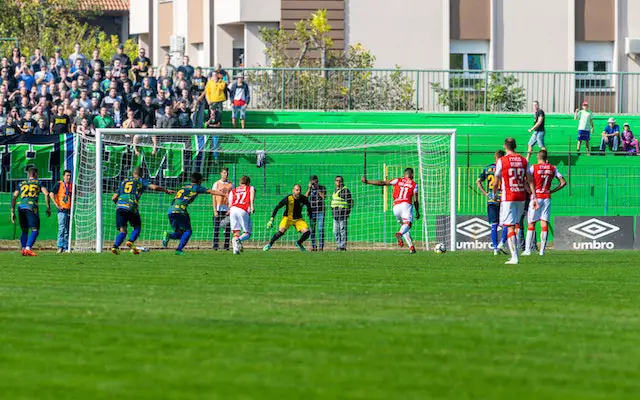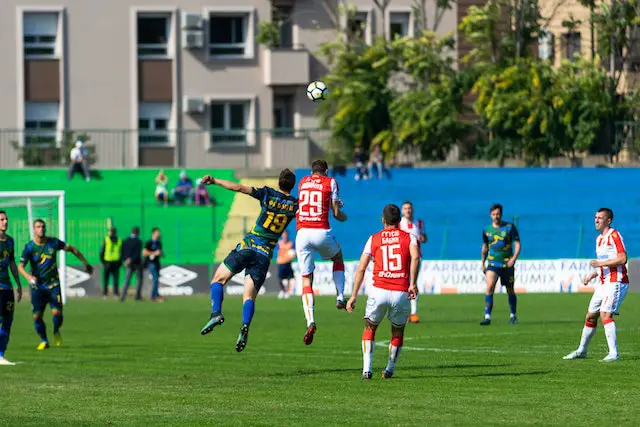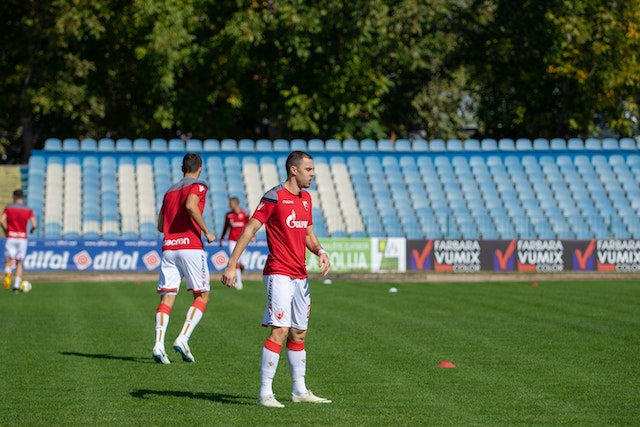Are you curious about the common causes of stress in professional soccer? Well, let’s dive right into it. The high stakes, the constant pressure to perform, and the intense scrutiny from fans and the media are just a few factors that contribute to the stress levels experienced by these athletes.
Whether it’s the fear of making a crucial mistake on the field or the relentless demand to always be at the top of their game, professional soccer players face a unique set of challenges that can take a toll on their mental and emotional well-being. But, of course, there’s more to it than meets the eye.
Stay tuned as we explore the various reasons behind the stress in the world of professional soccer.
Physical Demands
Intense training schedule
Being a professional soccer player requires a rigorous training schedule that can be physically demanding. You are expected to train for several hours each day, working on your fitness, technical skills, and tactical understanding of the game. This level of intensity can put a lot of strain on your body, as you push yourself to the limit in order to perform at your best on the field.
Injuries and physical pain
Playing soccer at a professional level also comes with the risk of injuries. From sprained ankles to torn ligaments, the physical nature of the sport means that you are constantly at risk of getting hurt. Dealing with injuries can be not only physically painful but also emotionally frustrating, as it often means spending time off the field and missing out on important matches and training sessions.
Physical fatigue
The demands of a professional soccer career can also lead to physical fatigue. Constantly pushing your body to its limits can leave you feeling worn out and exhausted. This can make it difficult to perform at your best, affecting your speed, agility, and overall endurance. It’s important to find the right balance between training and rest in order to prevent physical fatigue from affecting your performance.
Competition and Performance
Pressure to perform well

As a professional soccer player, there is immense pressure to perform well in every game. Your performance is constantly being evaluated by coaches, fans, and the media, and any mistakes or poor performances can be scrutinized. The pressure to perform well can be especially high in important matches or when you’re representing your country in international competitions.
Fear of failure
With the pressure to perform well comes the fear of failure. The fear of letting your teammates, coaches, and fans down can be overwhelming. This fear can sometimes cloud your judgment and affect your decision-making on the field, as you may be more likely to play it safe rather than taking risks that could lead to success.
Expectations from coaches and fans
Coaches and fans have high expectations for professional soccer players, and meeting these expectations can be mentally and emotionally challenging. There is a constant need to prove yourself, to justify your place in the team, and to satisfy the expectations of those around you. This constant pressure to live up to expectations can lead to stress and anxiety.
Constant Travel
Long distances and frequent trips
Professional soccer players often have to travel long distances for matches, both within their own country and internationally. This constant travel can be physically exhausting and mentally draining. Spending hours on airplanes or buses can take a toll on your body, leaving you feeling tired and fatigued. Additionally, frequent trips can disrupt your routine and make it difficult to maintain a healthy lifestyle.
Jet lag and disrupted sleep patterns
Traveling across time zones can also lead to jet lag, which can disrupt your sleep patterns and affect your overall well-being. Trying to adjust to new time zones while also preparing for important matches can be challenging. Lack of quality sleep can leave you feeling groggy, affect your concentration, and hinder your performance on the field.
Adjusting to different playing conditions
Playing in different stadiums and on different playing surfaces can also be a challenge for professional soccer players. Each stadium has its own unique atmosphere and conditions, from the climate to the pitch quality. Adapting to these changes quickly and effectively is crucial, as it can impact your performance and the outcome of the game.
Media and Public Attention

Constant scrutiny and criticism
Professional soccer players are constantly under the spotlight, with their every move being scrutinized by the media and fans. This constant scrutiny can be mentally and emotionally draining. Every mistake or poor performance is magnified, and the criticism can be harsh and relentless. Dealing with constant judgment and criticism can be a challenge, and it requires mental strength and resilience to handle it effectively.
Lack of privacy
Being in the public eye means that your personal life is often under scrutiny as well. There is a lack of privacy when you are a professional soccer player, with fans and the media wanting to know every detail of your life. Balancing your public and private persona can be difficult, as you try to maintain some level of privacy while also meeting the demands of the media and your fans.
Dealing with media interviews and obligations
Professional soccer players are often required to participate in media interviews and fulfill various obligations, such as sponsor events and public appearances. These commitments can be time-consuming and mentally draining, as you have to constantly be on your game both on and off the field. Managing your time and energy effectively is crucial in order to successfully balance your obligations and performance.
Team Dynamics
Working with diverse personalities
Being part of a professional soccer team means working with a diverse group of individuals, each with their own personality, background, and communication style. Building effective working relationships with teammates can be challenging, as you have to navigate different personalities and find ways to effectively work together towards a common goal. This requires strong communication skills, empathy, and the ability to adapt to different working styles.

Internal conflicts and egos
Team dynamics can be complicated, with the potential for internal conflicts and egos clashing. The competitive nature of professional soccer can sometimes lead to tensions within the team, as players vie for playing time and recognition. Managing these conflicts and ensuring that ego does not affect team performance is crucial for success.
Role ambiguity and competition within the team
In a highly competitive environment, there can be ambiguity around roles and playing time within the team. As a professional soccer player, you may find yourself competing with teammates for a spot in the starting lineup or for certain positions on the field. This competition can create a sense of insecurity and heightened pressure to perform, as you constantly have to prove yourself and fight for your place in the team.
High-Stakes Matches
Importance of crucial games
Certain matches carry a higher level of importance than others, such as championship finals or key matches in a relegation battle. The weight of representing your club or country in these high-stakes matches can be immense. The pressure to perform well and achieve a positive outcome can lead to increased stress and anxiety.
High expectations from fans and sponsors
High-stakes matches often come with heightened expectations from fans and sponsors. The desire to please these stakeholders and maintain positive relationships can add to the pressure of performing well. The fear of disappointing fans and losing sponsorships can create additional stress and anxiety for professional soccer players.
Feeling the weight of representing a club or country
When you step onto the field as a professional soccer player, you are not just representing yourself but also your club or country. This responsibility can be a source of stress and anxiety, as you carry the hopes and dreams of your team’s supporters or an entire nation. The weight of this responsibility can be overwhelming, and it requires mental strength and resilience to handle the pressure effectively.

Managing Work-Life Balance
Time constraints and limited personal time
The demands of a professional soccer career can make it difficult to maintain a healthy work-life balance. Training sessions, matches, and travel can take up a significant amount of your time, leaving little time for personal pursuits or relaxation. Finding ways to prioritize your personal well-being and maintain a healthy lifestyle can be a challenge.
Difficulty in maintaining relationships
The intense schedule and constant travel associated with professional soccer can make it difficult to maintain relationships outside of the sport. Spending long periods of time away from loved ones and missing important family events or personal milestones can be challenging emotionally. Building and maintaining meaningful relationships while pursuing a professional soccer career requires effort and effective time management.
Missing important family and personal events
The unpredictability of a professional soccer career means that you may occasionally have to miss important family events or personal milestones. Birthdays, anniversaries, and holidays may coincide with important matches or training camps. Missing these events can be emotionally difficult, leaving you feeling disconnected from your loved ones and struggling to balance your personal and professional life.
Financial Pressures
Expectations to fulfill high-paying contracts
Professional soccer players often sign high-paying contracts, which come with the expectation of performing at a certain level. Meeting these expectations can create financial pressure, as failure to meet performance targets can potentially jeopardize contracts and future earnings. The need to fulfill these contracts can add an additional layer of stress to an already demanding career.
Financial uncertainty in a short-lived career
Soccer careers are typically short-lived, with most players retiring in their late 30s or early 40s. This short window of opportunity to earn significant income can create financial uncertainty for professional soccer players. The need to save and invest wisely to secure your future after retirement can be a source of stress and anxiety.
Pressure to secure future contracts
As your soccer career progresses, you may have to negotiate and secure future contracts with different clubs or teams. The pressure to impress potential employers and secure lucrative contracts can be challenging to navigate. The fear of not finding suitable opportunities or earning less than anticipated can create anxiety and uncertainty about your future career prospects.
Coaching and Management Changes
Turmoil caused by frequent changes
Coaching and management changes are common in the world of professional soccer. These changes can bring about a sense of insecurity and instability within the team. Adjusting to new coaching styles, tactics, and expectations can be challenging, as you have to quickly adapt to new systems and prove yourself to a new set of individuals.
Adapting to new coaching styles and tactics
Each coach brings their own unique coaching style and tactical approach to the game. As a professional soccer player, you have to quickly adapt to these changes and align yourself with the new coach’s vision for the team. Adjusting to new training methods, formations, and playing styles can be mentally and physically demanding, requiring flexibility and openness to change.
Insecurity about future opportunities
Coaching and management changes can also bring about a sense of insecurity about future opportunities within the team. A new coach may have different preferences and may bring in new players, potentially affecting your playing time and position within the team. This sense of uncertainty and competition can be mentally challenging to navigate, as you try to secure your place within the team and continue to excel in your career.

Retirement and Transition
Post-career uncertainty
The transition from a professional soccer career to retirement can be daunting and uncertain. As a professional athlete, your life is centered around soccer, and retirement marks the end of that identity and routine. Adjusting to a new way of life and finding a sense of purpose outside of the sport can be a challenge, leading to feelings of uncertainty and even depression.
Identity crisis and loss of purpose
Retirement from professional soccer can also bring about an identity crisis and a loss of purpose. For many players, soccer has been the focus of their lives for as long as they can remember. The sudden absence of that identity and the loss of the daily routine can leave you feeling lost and unsure of your place in the world.
Adjusting to life without professional soccer
The transition to life without professional soccer requires adapting to a new routine and finding fulfillment in other areas of life. Building a new identity, exploring new interests and passions, and finding ways to stay connected to the sport can help ease the adjustment. However, it is a process that takes time and requires self-reflection and support from loved ones.


